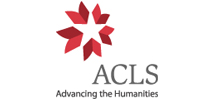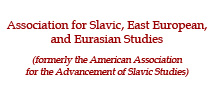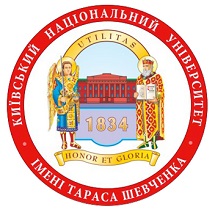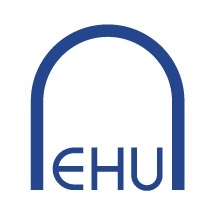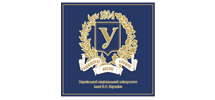«Digital Spaces East-West: Journals, Blogs, and Educational Projects»
В этом году на конгрессе Association for Slavic, East European, and Eurasian Studies (ASEEES) в Бостоне 21-24 ноября МАГ является спонсором круглого стола «Digital Spaces East-West: Journals, Blogs, and Educational Projects» и собрания Международной ассоциации гуманитариев. Кроме того, два члена МАГ, Елена Дутчак и Олег Романько, получили гранты на поездку на конгресс и тоже представят свои доклады.
Ниже подробная информация о спонсируемых МАГ мероприятиях:
Thu Nov 21 2013, 2:00 to 3:45pm
Boston Marriott Copley Place, 3rd Floor – Suffolk
Cultural Revolution and Christian Dissent in the USSR, 1928-1982
Chair: Roy Raymond Robson (U of the Sciences in Philadelphia)
The Taiga Skit and the Siberian Peasant Community: Interaction Models in Terms of the 'Agrarian Revolution' of the 1930s
Elena Dutchak (Tomsk State U (Russia))
Soviet Power and the Prophecies of Maksim Rudometkin, 1928-1982
J. Eugene Clay (Arizona State U)
Dissidence or De-atomization? Moscow Clerics and Their Search for Orthodox Normalcy in Brezhnev’s USSR
Nicholas Ganson (Bridgewater State U)
Discussant: Chris J. Chulos (Roosevelt U)
Brief Description
The 1917 Bolshevik revolution introduced the first officially atheist state in history, and the Stalinist cultural revolution sought to destroy forcibly the traditional social and significance of religion. Christians, who often embraced utopian projects of their own, had to decide whether to embrace, resist, or withdraw from the Soviet project. This panel examines three groups of Christian dissenters (Siberian Old Believers, Spiritual Christian-Molokans, and a vocal group of Brezhnev-era Russian Orthodox priests) and their relationships to Soviet power and society.
Fri Nov 22 2013, 1:00 to 2:45pm
Boston Marriott Copley Place, 3rd Floor – Simmons
Modes of Collaboration During WWII on the Eastern Front
Chair: William G. Rosenberg (U of Michigan)
'Shmal'tsovniki': Civilian Bounty Hunters in German-Occupied Galicia, 1941-1944
Jeffrey Burds (Northeastern U)
Russian Collaborationist Organizations and the 'Jewish Problem' in the Period of the Second World War
Oleg Valentinovich Romanko (SI Georgievskiy Crimean State Medical U (Ukraine))
Police, Partisans and “Povstantsi” in the Volhynian Wilderness of Mirrors
Jared Graham McBride (UCLA)
Discussant: Jan Grabowski (U of Ottawa (Canada))
Brief Description
This panel will explore various approaches to the difficult topic of collaboration during the Second World War. The topic of collaboration has remained a controversial one for decades, but new and innovative research is changing the way we understand and make sense of this wide-spread phenomenon from the war. This panel will deal with collaboration in various regions (Galicia, Volhynia in Ukraine, as well as different experiences and forms of collaboration ranging the village level in occupied Ukraine to well-known military units.
Sat Nov 23 2013, 3:00 to 4:45pm
Boston Marriott Copley Place, 4th Floor - Grand Ballroom Salon G
Digital Spaces East-West: Journals, Blogs, and Educational Projects
Chair: Tamara Hundorova (National Academy of Sciences (Ukraine))
Elena Gapova (Western Michigan U/European Humanities U (Lithuania))
Volodymyr Kravchenko (Canadian Institute of Ukrainian Studies (Canada))
Andrea Lanoux (Connecticut College)
Ellen Rutten (U of Amsterdam (Netherlands))
Tatiana Tatarchevskiy (Sacred Heart U)
Brief Description
In the fall, the International Association for the Humanities began publishing its own electronic newsletter The Bridge/Мост http://thebridge-moct.org/ which seeks to connect the humanities scholars of the region and to become the forum for discussing the "burning issues" in academia. The roundtable which is initiated by IAH is going to focus on various digital projects (newsletters, zines, major blogs, and educational projects) that seek to promote knowledge of the post-socialist region or “bridge together” individual scholars, as well as academic and cultural communities. The questions that are to be discussed: How do their creators see their mission? How do these projects change the knowledge of the region/the perception of it? How do they contribute to scholarship? The spread of social media led to the growth of various digital projects (educational, informational, and others) focused on the post-socialist region. While a roundtable can incorporate a certain number of presenters, it allows, at the same time, an active participation by the audience, which is the key in the discussion of such fast growing and diverse field as social media.
Sun Nov 24 2013, 10:00 to 11:45am
Boston Marriott Copley Place / Massachusetts
Affiliate Group Meetings: International Association for the Humanities
Другие новости
7 ноября 2013 года
Гуманитарные науки и демократизация на постсоветском пространстве
31 октября 2013 года
«Digital Spaces East-West: Journals, Blogs, and Educational Projects»
ГОЛОВНА | HOME PAGE | ГАЛОЎНАЯ | ГЛАВНАЯ

НОВИНИ Й АНОНСИ
29 апреля 2022 года
19 апреля 2022 года
10 апреля 2022 года


